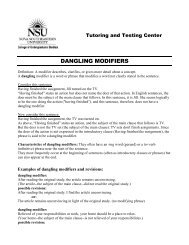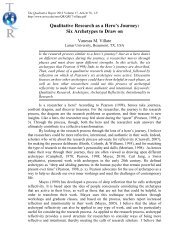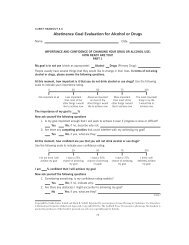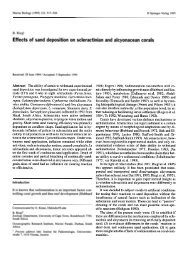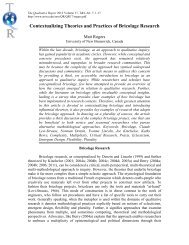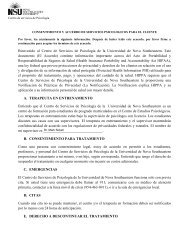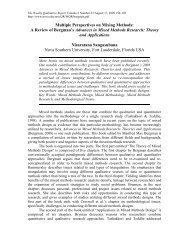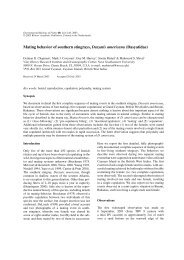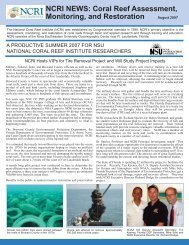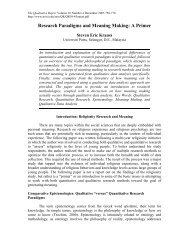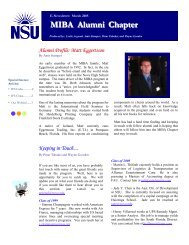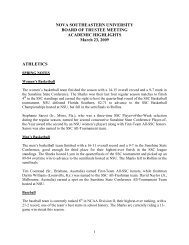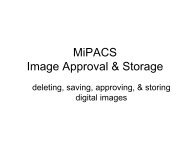- Page 2 and 3:
Contents Sponsors..................
- Page 4 and 5:
Sponsors 11th ICRS Co-Sponsors Barr
- Page 6 and 7:
Mini-Symposium Co-Chairs Mini-Sympo
- Page 8:
Mini-Symposium 23: Reef Management
- Page 12 and 13:
Plenary Lessons from the Past Malco
- Page 14:
Plenary Drivers of Coral Infectious
- Page 18 and 19:
1-1 The R/v Alpha Helix Symbios Exp
- Page 20 and 21:
1-9 Coral Community Change Over A C
- Page 22 and 23:
1-17 Holocene Reef Development At T
- Page 24 and 25:
1-25 Paleoecology Of Mio-Pliocene F
- Page 26 and 27:
Oral Mini-Symposium 2: Biotic Respo
- Page 28 and 29:
Oral Mini-Symposium 2: Biotic Respo
- Page 30 and 31:
Oral Mini-Symposium 3: Calcificatio
- Page 32 and 33:
Oral Mini-Symposium 3: Calcificatio
- Page 34 and 35:
3-17 The Effect Of Depressed Aragon
- Page 36 and 37:
Oral Mini-Symposium 4: Coral Reef O
- Page 38 and 39:
Oral Mini-Symposium 4: Coral Reef O
- Page 40 and 41:
Oral Mini-Symposium 4: Coral Reef O
- Page 42 and 43:
Oral Mini-Symposium 4: Coral Reef O
- Page 44 and 45:
Oral Mini-Symposium 5: Functional B
- Page 46 and 47:
Oral Mini-Symposium 5: Functional B
- Page 48 and 49:
Oral Mini-Symposium 5: Functional B
- Page 50 and 51:
Oral Mini-Symposium 5: Functional B
- Page 52 and 53:
Oral Mini-Symposium 5: Functional B
- Page 54 and 55:
Oral Mini-Symposium 5: Functional B
- Page 56 and 57:
Oral Mini-Symposium 6: Ecological a
- Page 58 and 59:
Oral Mini-Symposium 6: Ecological a
- Page 60 and 61:
Oral Mini-Symposium 6: Ecological a
- Page 62 and 63:
Oral Mini-Symposium 6: Ecological a
- Page 64 and 65:
7-5 Coral Yellow Band Disease; Curr
- Page 66 and 67:
7-13 Black Band Disease (BBD): A Po
- Page 68 and 69:
7-21 Coral Host Processes Associate
- Page 70 and 71:
7-29 Can the Presence of Disease Si
- Page 72 and 73:
7-37 Developing An Expert System Fo
- Page 74 and 75:
7-45 The Effect Of Sediment And Hea
- Page 76 and 77:
8-1 From Bacterial Bleaching To The
- Page 78 and 79:
8-9 Milkfish Feces Share Common Bac
- Page 80 and 81:
8-17 Bacteria Associated With Symbi
- Page 82 and 83:
8-26 Photosynthetic Microorganisms
- Page 84 and 85:
8-35 Tissue Loss And Tropical Storm
- Page 86 and 87:
9-5 Evaluation Of Biotic And Abioti
- Page 88 and 89:
9-13 Is Allelopathy Involved in Cor
- Page 90 and 91:
Oral Mini-Symposium 10: Ecological
- Page 92 and 93:
Oral Mini-Symposium 10: Ecological
- Page 94 and 95:
Oral Mini-Symposium 10: Ecological
- Page 96 and 97:
Oral Mini-Symposium 10: Ecological
- Page 98 and 99:
Oral Mini-Symposium 10: Ecological
- Page 100 and 101:
10-41 Substrate Effects On Reef Fis
- Page 102 and 103:
Oral Mini-Symposium 10: Ecological
- Page 104 and 105:
Oral Mini-Symposium 10: Ecological
- Page 106 and 107:
Oral Mini-Symposium 10: Ecological
- Page 108 and 109:
Oral Mini-Symposium 11: From Molecu
- Page 110 and 111:
Oral Mini-Symposium 11: From Molecu
- Page 112 and 113:
Oral Mini-Symposium 11: From Molecu
- Page 114 and 115:
Oral Mini-Symposium 11: From Molecu
- Page 116 and 117:
Oral Mini-Symposium 11: From Molecu
- Page 118 and 119:
12-5 The Contribution Of Heterotrop
- Page 120 and 121:
12-14 Ocean Dynamics Drive Coral Re
- Page 122 and 123:
12-23 Coral Reef Resilience To Chro
- Page 124 and 125:
13-1 Prioritizing Conservation Hots
- Page 126 and 127:
Oral Mini-Symposium 13: Evolution a
- Page 128 and 129:
14-6 Modelling Coral Larval Dispers
- Page 130 and 131:
14-14 Environmentally-Mediated Vari
- Page 132 and 133:
14-21 Same, Same, But Different: Co
- Page 134 and 135:
14-29 Complex Patterns of Genetic C
- Page 136 and 137:
14-37 Genetic Connectivity in Phili
- Page 138 and 139:
14-45 Range-Wide Population Genetic
- Page 140 and 141:
14-55 The Importance Of Behavior On
- Page 142 and 143:
Oral Mini-Symposium 15: Progress in
- Page 144 and 145:
Oral Mini-Symposium 15: Progress in
- Page 146 and 147:
Oral Mini-Symposium 16: Ecosystem A
- Page 148 and 149:
Oral Mini-Symposium 16: Ecosystem A
- Page 150 and 151:
Oral Mini-Symposium 16: Ecosystem A
- Page 152 and 153:
Oral Mini-Symposium 16: Ecosystem A
- Page 154 and 155:
Oral Mini-Symposium 16: Ecosystem A
- Page 156 and 157:
Oral Mini-Symposium 16: Ecosystem A
- Page 158 and 159:
Oral Mini-Symposium 17: Emerging Te
- Page 160 and 161:
Oral Mini-Symposium 17: Emerging Te
- Page 162 and 163:
Oral Mini-Symposium 17: Emerging Te
- Page 164 and 165:
Oral Mini-Symposium 17: Emerging Te
- Page 166 and 167:
Oral Mini-Symposium 17: Emerging Te
- Page 168 and 169:
18-5 Coral Reef Habitat Around New
- Page 170 and 171:
18-13 Response Of High Latitude Her
- Page 172 and 173:
18-21 Socio-Economic Monitoring (So
- Page 174 and 175:
18-29 Extent And Timing Of Disturba
- Page 176 and 177:
18-37 It Depends On Where You Look:
- Page 178 and 179:
18-45 New Insights Into The Exposur
- Page 180 and 181:
Oral Mini-Symposium 19: Biogeochemi
- Page 182 and 183:
Oral Mini-Symposium 19: Biogeochemi
- Page 184 and 185:
Oral Mini-Symposium 19: Biogeochemi
- Page 186 and 187:
Oral Mini-Symposium 19: Biogeochemi
- Page 188 and 189:
Oral Mini-Symposium 20: Modeling Co
- Page 190 and 191:
Oral Mini-Symposium 20: Modeling Co
- Page 192 and 193:
21-9 Integrated Economic Valuation
- Page 194 and 195:
21-19 Towards Local Fishers Partici
- Page 196 and 197:
21-27 The Political Aspects Of Resi
- Page 198 and 199:
21-37 Exploitation And Trade Of Cor
- Page 200 and 201:
22-1 Complex Ecological Effects Of
- Page 202 and 203:
22-9 Comparative Evaluation Of Reef
- Page 204 and 205:
22-17 Managing Fishing Gear To Enco
- Page 206 and 207:
22-25 Estimating Harvest Pressure O
- Page 208 and 209:
22-33 Are The Coral Reef Finfish Fi
- Page 210 and 211:
22-41 Using Length-Frequency Data T
- Page 212 and 213:
22-50 Changes in Ecosystem Structur
- Page 214 and 215:
23-5 Measuring Success in Managing
- Page 216 and 217:
23-13 Some Hints About The Impacts
- Page 218 and 219:
23-21 Fishery Management For Artisa
- Page 220 and 221:
23-29 “To Live With The Sea”; D
- Page 222 and 223:
23-37 Challenges Facing An Mpa Mana
- Page 224 and 225:
23-45 Assessing Global Coral Reef M
- Page 226 and 227:
23-53 Developing A Model For Ecosys
- Page 228 and 229:
23-61 Mitigating The Effects Of Cor
- Page 230 and 231:
23-69 Restore Or Not To Restore? Vl
- Page 232 and 233:
24-1 Fates Of Restored Acropora Pal
- Page 234 and 235:
24-9 Sponge-Mediated Coral Reef Res
- Page 236 and 237:
24-17 Coral Community Restorations
- Page 238 and 239:
24-25 Development Of A Coral Nurser
- Page 240 and 241:
24-33 Transplantation of Porites lu
- Page 242 and 243:
24-41 Scleractinian Coral Relocatio
- Page 244 and 245:
24-50 Gametogenesis in Cultured Ver
- Page 246 and 247:
Oral Mini-Symposium 25: Predicting
- Page 248 and 249:
Oral Mini-Symposium 25: Predicting
- Page 250 and 251:
Oral Mini-Symposium 25: Predicting
- Page 252 and 253:
Oral Mini-Symposium 25: Predicting
- Page 254 and 255:
Oral Mini-Symposium 25: Predicting
- Page 256 and 257:
Oral Mini-Symposium 25: Predicting
- Page 258 and 259:
Oral Mini-Symposium 25: Predicting
- Page 260 and 261:
Oral Mini-Symposium 26: Biodiversit
- Page 262 and 263:
Oral Mini-Symposium 26: Biodiversit
- Page 264 and 265:
Oral Mini-Symposium 26: Biodiversit
- Page 266 and 267:
Oral Mini-Symposium 26: Biodiversit
- Page 268 and 269:
Oral Mini-Symposium 26: Biodiversit
- Page 270 and 271:
Oral Mini-Symposium 26: Biodiversit
- Page 272 and 273:
26-54 Gene Genealogies Reveal Phylo
- Page 274 and 275:
Oral Mini-Symposium 26: Biodiversit
- Page 276:
Poster Session
- Page 279 and 280:
1.13 Depth-Related Patterns of Infa
- Page 281 and 282:
1.20 Grain Size And Sedimentary Con
- Page 283 and 284:
1.3 Environmental Effects On Back-R
- Page 285 and 286:
Poster Mini-Symposium 2: Biotic Res
- Page 287 and 288:
Poster Mini-Symposium 3: Calcificat
- Page 289 and 290:
Poster Mini-Symposium 3: Calcificat
- Page 291 and 292:
Poster Mini-Symposium 3: Calcificat
- Page 293 and 294:
Poster Mini-Symposium 4: Coral Reef
- Page 295 and 296:
Poster Mini-Symposium 4: Coral Reef
- Page 297 and 298:
Poster Mini-Symposium 4: Coral Reef
- Page 299 and 300:
Poster Mini-Symposium 4: Coral Reef
- Page 301 and 302:
Poster Mini-Symposium 5: Functional
- Page 303 and 304:
Poster Mini-Symposium 5: Functional
- Page 305 and 306:
Poster Mini-Symposium 5: Functional
- Page 307 and 308:
Poster Mini-Symposium 5: Functional
- Page 309 and 310:
Poster Mini-Symposium 5: Functional
- Page 311 and 312:
Poster Mini-Symposium 5: Functional
- Page 313 and 314:
Poster Mini-Symposium 5: Functional
- Page 315 and 316:
Poster Mini-Symposium 5: Functional
- Page 317 and 318:
Poster Mini-Symposium 5: Functional
- Page 319 and 320:
Poster Mini-Symposium 6: Ecological
- Page 321 and 322:
7.162 Disease Ecology And Local Pat
- Page 323 and 324:
7.170 Coralline Algal Disease in Th
- Page 325 and 326:
7.179 Physiological Effects Of Aspe
- Page 327 and 328:
7.187 Characterizing Surface Microo
- Page 329 and 330:
7.195 How Quickly Does gorgonia Ven
- Page 331 and 332:
7.203 Spatial and temporal variabil
- Page 333 and 334:
8.210 Quorum Sensing Inhibitory Act
- Page 335 and 336:
8.218 Bacterial Communities Associa
- Page 337 and 338:
8.226 Bacterial Growth On Coral Muc
- Page 339 and 340:
8.234 Functional Diversity of Micro
- Page 341 and 342:
8.242 Microbial Community Profile O
- Page 343 and 344:
9.248 Chemistry And Ecology Of A Co
- Page 345 and 346:
Poster Mini-Symposium 10: Ecologica
- Page 347 and 348:
Poster Mini-Symposium 10: Ecologica
- Page 349 and 350:
Poster Mini-Symposium 10: Ecologica
- Page 351 and 352:
Poster Mini-Symposium 10: Ecologica
- Page 353 and 354:
Poster Mini-Symposium 10: Ecologica
- Page 355 and 356:
Poster Mini-Symposium 10: Ecologica
- Page 357 and 358:
Poster Mini-Symposium 10: Ecologica
- Page 359 and 360:
Poster Mini-Symposium 10: Ecologica
- Page 361 and 362:
Poster Mini-Symposium 10: Ecologica
- Page 363 and 364:
Poster Mini-Symposium 10: Ecologica
- Page 365 and 366:
Poster Mini-Symposium 10: Ecologica
- Page 367 and 368:
Poster Mini-Symposium 10: Ecologica
- Page 369 and 370:
Poster Mini-Symposium 10: Ecologica
- Page 371 and 372:
Poster Mini-Symposium 10: Ecologica
- Page 373 and 374:
Poster Mini-Symposium 10: Ecologica
- Page 375 and 376:
Poster Mini-Symposium 10: Ecologica
- Page 377 and 378:
Poster Mini-Symposium 11: From Mole
- Page 379 and 380:
Poster Mini-Symposium 11: From Mole
- Page 381 and 382:
Poster Mini-Symposium 11: From Mole
- Page 383 and 384:
12.413 Spatial Patterns Of Stony Co
- Page 385 and 386:
Poster Mini-Symposium 13: Evolution
- Page 387 and 388:
Poster Mini-Symposium 13: Evolution
- Page 389 and 390:
14.432 Gene flow of Symbiodinium on
- Page 391 and 392:
14.441 Population Genetics Of Spott
- Page 393 and 394:
14.449 Mitochondrial Phylogeography
- Page 395 and 396:
14.457 Undirect Evidences On The Co
- Page 397 and 398:
14.466 South East African, High-Lat
- Page 399 and 400:
14.474 Population Genetic Structure
- Page 401 and 402:
14.483 Influences Of Wind-Wave Expo
- Page 403 and 404:
14.491 Distributions And Diversity
- Page 405 and 406:
14.499 Do Mangroves And Seagrass Be
- Page 407 and 408:
14.507 Genetic variation of the hyd
- Page 409 and 410:
Poster Mini-Symposium 15: Progress
- Page 411 and 412:
Poster Mini-Symposium 15: Progress
- Page 413 and 414:
Poster Mini-Symposium 16: Ecosystem
- Page 415 and 416:
Poster Mini-Symposium 16: Ecosystem
- Page 417 and 418:
Poster Mini-Symposium 16: Ecosystem
- Page 419 and 420:
Poster Mini-Symposium 17: Emerging
- Page 421 and 422:
Poster Mini-Symposium 17: Emerging
- Page 423 and 424:
Poster Mini-Symposium 17: Emerging
- Page 425 and 426:
Poster Mini-Symposium 17: Emerging
- Page 427 and 428:
Poster Mini-Symposium 17: Emerging
- Page 429 and 430:
Poster Mini-Symposium 17: Emerging
- Page 431 and 432:
18.599 A Palaeoecological Perspecti
- Page 433 and 434:
18.607 Susceptibility Of Corals To
- Page 435 and 436:
18.616 Coral Reefs in Costa Rican C
- Page 437 and 438:
18.624 Environmental Endocrine Disr
- Page 439 and 440:
18.633 Northern Acehnese Coral Reef
- Page 441 and 442:
18.641 The Status Of Coral Reefs in
- Page 443 and 444:
18.649 The Effects of Increased Sea
- Page 445 and 446:
18.658 “Changing Times, Changing
- Page 447 and 448:
18.666 Assessing Land Based Inputs
- Page 449 and 450:
18.674 Monitoring Of Coral Recovery
- Page 451 and 452:
18.682 Seasonal Investigation On St
- Page 453 and 454:
18.690 Assessment Of The Coral Reef
- Page 455 and 456:
18.698 Distribution Of Seagrasses i
- Page 457 and 458:
18.706 Coral Reef Monitoring in the
- Page 459 and 460:
18.714 Pacific-Wide Status Of The R
- Page 461 and 462:
18.722 Quantitative Underwater Ecol
- Page 463 and 464:
18.730 Community Structure Of Reef
- Page 465 and 466:
18.738 Morphological Variation In T
- Page 467 and 468:
18.746 Decade-Long (1998-2007) Tren
- Page 469 and 470:
18.755 Coral Community Composition
- Page 471 and 472:
18.763 Changes in Coral Reef Ecosys
- Page 473 and 474: 18.771 Bathymetric Distribution Of
- Page 475 and 476: Poster Mini-Symposium 19: Biogeoche
- Page 477 and 478: Poster Mini-Symposium 19: Biogeoche
- Page 479 and 480: Poster Mini-Symposium 19: Biogeoche
- Page 481 and 482: Poster Mini-Symposium 20: Modeling
- Page 483 and 484: 21.807 The Recreational Value Of Co
- Page 485 and 486: 21.815 Dilemma in Coral Conservatio
- Page 487 and 488: 22.821 Estimating Populations Of Tw
- Page 489 and 490: 22.829 Commercial Topshell, trochus
- Page 491 and 492: 22.837 Trajectories Of Ecosystem Ch
- Page 493 and 494: 22.845 Ornamental Fish Trade in The
- Page 495 and 496: 22.854 Short-Term Recovery Of Explo
- Page 497 and 498: 22.863 Marine Protected Areas: Boon
- Page 499 and 500: 22.871 Rotary Time-Lapse Photograph
- Page 501 and 502: 22.879 Assessing And Mapping The Di
- Page 503 and 504: 22.887 Spatial Variations in Elemen
- Page 505 and 506: 23.1004 Coral Reef Conservation Cam
- Page 507 and 508: 23.1014 Second And Third Order Mana
- Page 509 and 510: 23.1023 Why do Divers Dive Where Th
- Page 511 and 512: 23.1031 The Colonial Tunicate tridi
- Page 513 and 514: 23.1039 Effectiveness Of A Small Mp
- Page 515 and 516: 23.893 Man Made Stress Reliever? An
- Page 517 and 518: 23.901 Reef Monitoring Project For
- Page 519 and 520: 23.909 Patterns Of Spatial Variabil
- Page 521 and 522: 23.917 Culture And Updated Traditio
- Page 523: 23.925 Scientific Monitoring And Cu
- Page 527 and 528: 23.942 Challenges in Coral Reef Man
- Page 529 and 530: 23.951 Coral Reef-Based Tourism And
- Page 531 and 532: 23.959 Marine Protected Area Report
- Page 533 and 534: 23.967 Reef Watch Monitoring And Ho
- Page 535 and 536: 23.975 A Comparison Of The Permanen
- Page 537 and 538: 23.984 Damselfish Embryo Assay: Fie
- Page 539 and 540: 23.992 The Decline Of Coral Reef Co
- Page 541 and 542: 24.1043 Characteristics Of Seagrass
- Page 543 and 544: 24.1051 Mass Culture Of acropora Co
- Page 545 and 546: 24.1059 Identifying Sediment-Tolera
- Page 547 and 548: 24.1067 Growth Of Newly Settled Ree
- Page 549 and 550: 24.1076 Herbivore Effects On Coral
- Page 551 and 552: 24.1084 Coral Reefs Conservation Pr
- Page 553 and 554: 24.1092 Lessons Learned On Demonstr
- Page 555 and 556: 24.1100 Proceedings in Shipgroundin
- Page 557 and 558: 24.1108 Restoring An Artificial "En
- Page 559 and 560: 24.1116 A Newly Established Coral R
- Page 561 and 562: 24.1124 Is The Scale Of Your Coral
- Page 563 and 564: Poster Mini-Symposium 25: Predictin
- Page 565 and 566: Poster Mini-Symposium 25: Predictin
- Page 567 and 568: Poster Mini-Symposium 25: Predictin
- Page 569 and 570: Poster Mini-Symposium 25: Predictin
- Page 571 and 572: Poster Mini-Symposium 25: Predictin
- Page 573 and 574: Poster Mini-Symposium 26: Biodivers
- Page 575 and 576:
Poster Mini-Symposium 26: Biodivers
- Page 577 and 578:
Poster Mini-Symposium 26: Biodivers
- Page 579 and 580:
Poster Mini-Symposium 26: Biodivers
- Page 581 and 582:
Poster Mini-Symposium 26: Biodivers
- Page 583 and 584:
Poster Mini-Symposium 26: Biodivers
- Page 585 and 586:
Poster Mini-Symposium 26: Biodivers
- Page 587 and 588:
Poster Mini-Symposium 26: Biodivers
- Page 589 and 590:
Poster Mini-Symposium 26: Biodivers
- Page 591 and 592:
Memo ..............................
- Page 593 and 594:
Authors INDEX Author Session Page A
- Page 595 and 596:
Authors INDEX Author Session Page A
- Page 597 and 598:
Authors INDEX Author Session Page A
- Page 599 and 600:
Authors INDEX Author Session Page A
- Page 601 and 602:
Authors INDEX Author Session Page A
- Page 603 and 604:
Authors INDEX Author Session Page A
- Page 605 and 606:
Authors INDEX Author Session Page A
- Page 607 and 608:
Authors INDEX Author Session Page A
- Page 609 and 610:
Authors INDEX Author Session Page A
- Page 611 and 612:
Authors INDEX Author Session Page A
- Page 613 and 614:
Authors INDEX Author Session Page A
- Page 615 and 616:
Authors INDEX Author Session Page A
- Page 617 and 618:
Authors INDEX Author Session Page A
- Page 619 and 620:
Authors INDEX Author Session Page A
- Page 621 and 622:
Authors INDEX Author Session Page A
- Page 623 and 624:
Authors INDEX Author Session Page A
- Page 625 and 626:
Authors INDEX Author Session Page A
- Page 627 and 628:
Authors INDEX Author Session Page A
- Page 629 and 630:
Authors INDEX Author Session Page A
- Page 631 and 632:
Authors INDEX Author Session Page A
- Page 633 and 634:
Authors INDEX Author Session Page A
- Page 635 and 636:
Authors INDEX Author Session Page A
- Page 637 and 638:
Authors INDEX Author Session Page A
- Page 639 and 640:
Authors INDEX Author Session Page A
- Page 641 and 642:
Authors INDEX Author Session Page A
- Page 643 and 644:
Authors INDEX Author Session Page A
- Page 645 and 646:
Authors INDEX Author Session Page A
- Page 647 and 648:
Authors INDEX Author Session Page A



